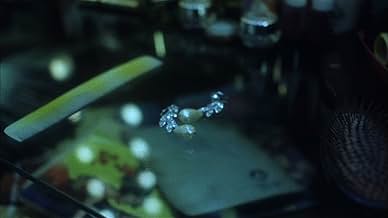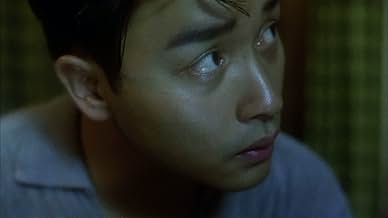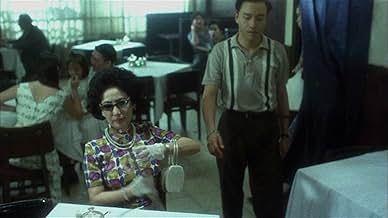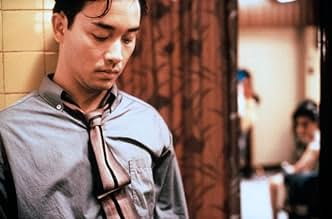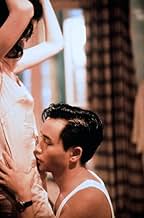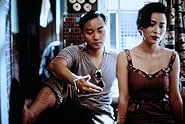IMDb RATING
7.4/10
28K
YOUR RATING
A man tries to find out who his real mother is after the woman who raised him tells him the truth.A man tries to find out who his real mother is after the woman who raised him tells him the truth.A man tries to find out who his real mother is after the woman who raised him tells him the truth.
- Awards
- 17 wins & 9 nominations total
Rebecca Pan
- Rebecca
- (as Tik-Wa Poon)
Tony Leung Chiu-wai
- Chow Mo-wan
- (as Tony Chiu Wai Leung)
- Director
- Writers
- All cast & crew
- Production, box office & more at IMDbPro
Featured reviews
Sublime suspension.
A very satisfying affair: here's the first project where Kar-Wai Wong found his groove with the Spanish notion of metastory, the story about how one hesitates in resolving what they see in life. And how that is a matter of touch. And how touch is word and how one can touch and speak with the eye.
The first project with Doyle. And with Maggie. In a way, the first version of "Mood/2046." I think no one understands cinematically suspended longing like this man. When you enter this, you enter a space where everything is connected, every connection is passionately loaded and seen. But there is no logic, no comprehension, no future. Ever.
Its anti-love but fulfilling nonetheless. Its empty in a rich way. Its about created selves in the French New Wave sense, but those selves then being honestly inhabited.
If you love, really love, it has to rest on the earth in some way. There seem to be only a few ways to rest, the usual one being a matter of anchors and roots. This is different, a matter of frictionless liquidity a local zone of antigravity where the love seems fixed by never really touches the planet. There are several metaphors in the story along these lines.
We may not have the courage to love in this way even if we are among the few who chance love at all. But it is a rather sublime visit, this.
Ted's Evaluation -- 3 of 3: Worth watching.
A very satisfying affair: here's the first project where Kar-Wai Wong found his groove with the Spanish notion of metastory, the story about how one hesitates in resolving what they see in life. And how that is a matter of touch. And how touch is word and how one can touch and speak with the eye.
The first project with Doyle. And with Maggie. In a way, the first version of "Mood/2046." I think no one understands cinematically suspended longing like this man. When you enter this, you enter a space where everything is connected, every connection is passionately loaded and seen. But there is no logic, no comprehension, no future. Ever.
Its anti-love but fulfilling nonetheless. Its empty in a rich way. Its about created selves in the French New Wave sense, but those selves then being honestly inhabited.
If you love, really love, it has to rest on the earth in some way. There seem to be only a few ways to rest, the usual one being a matter of anchors and roots. This is different, a matter of frictionless liquidity a local zone of antigravity where the love seems fixed by never really touches the planet. There are several metaphors in the story along these lines.
We may not have the courage to love in this way even if we are among the few who chance love at all. But it is a rather sublime visit, this.
Ted's Evaluation -- 3 of 3: Worth watching.
Many people here seem to be of the opinion that this film is not very typical of Wong's work. I would like to disagree. To me, this film is a very typical Wong film. That is, if you are expecting the absolutely perfect colours, pictures and frames of 'In the Mood for Love', you will be disappointed. This film, like many of his other films, has a more rough quality to it.
All you who have seen 'In the Mood' and liked it should really see this film, as I don't think you can understand 'In the Mood' without having seen this one. I was not particularly overwhelmed by 'In the Mood', but now that I have seen this film, I at least understand the later film better. So maybe also those who did not like 'In the Mood' should see this one, as it might change their perception of that film.
To me Wong Kar-Wai's best film is still Chungking Express. And this film, although kind of in line with that film, does not reach up to that standard. I am glad I saw this film, as it explains other parts of Wong's work to me, but were it not for the sake of understanding that bigger picture, I don't think I would recommend it.
All you who have seen 'In the Mood' and liked it should really see this film, as I don't think you can understand 'In the Mood' without having seen this one. I was not particularly overwhelmed by 'In the Mood', but now that I have seen this film, I at least understand the later film better. So maybe also those who did not like 'In the Mood' should see this one, as it might change their perception of that film.
To me Wong Kar-Wai's best film is still Chungking Express. And this film, although kind of in line with that film, does not reach up to that standard. I am glad I saw this film, as it explains other parts of Wong's work to me, but were it not for the sake of understanding that bigger picture, I don't think I would recommend it.
In Wong Kar-wai's 1991 film Days of Being Wild, Yuddy (Leslie Cheung), a charming drifter captures the attention of store attendant Su Lizhen (Maggie Cheung) by asking her to look at his watch. When she sees that it says one minute before 3:00PM on April 16, 1960, he tells her that she will never forget the moment and will dream about him that night. The next time they meet, the moment becomes two, then one hour, then weeks and months but Yuddy is like the mythical bird with no legs that just flies and flies and never lands. Abandoned by his real mother and brought up by a wealthy alcoholic courtesan (Rebecca Pan), he does not know where he came from or where he is going. He treats women with little respect, discarding them when they no longer serve his purpose. When one lover asks him if he loves her, he tells her that during his life he will be friends with many, many women but won't know whom he truly loves until the end.
Days of Being Wild unfolds like a dream with color filters, unusual shadows, and the sights and sounds of Hong Kong's rainy nights and sweltering summers. Based on the director's memories from his childhood and admiration for the style of Argentinean novelist Manuel Puig (Heartbreak Tango), the film is a series of episodes involving six people who touch each other's lives. After his short-lived relationship with Su, Yuddy meets a cabaret dancer who calls herself Mimi (Carina Lau) but their relationship fares no better and she is left to suffer the consequences of their breakup. Meanwhile, Su meets Tide (Andy Lau), a gentle policeman whom she is able to confide until he suddenly leaves Hong Kong to become a sailor. Each character seeks a sense of identity and fulfillment. After Rebecca tells him of her plans to move to America with her boyfriend, she finally lets him know who and where his real mother is. After Yuddy goes to the Philippines to try to find his mother, the lives of the main protagonists come together in a powerful conclusion.
Days of Being Wild may sound like a soap opera but the film reaches a much higher artistic level. Supported by outstanding performances by Leslie Cheung, Maggie Cheung, and Jacky Cheung as Yuddy's only friend Zeb, it is a tone poem about longing and one's search for identity. We care about the characters even though they don't seem to care about themselves. Like many of us, they pine for the things that might have been, the word that was never said, and the love that remains elusive. A commercial failure but an artistic triumph, Days of Being Wild is a moody, atmospheric film that with its background of popular music, in this case 1950's rumbas and cha-cha's, forecasts the director's later In the Mood For Love. As a beautifully realized example of alienated people desperately seeking their place in the world, however, it stands securely on its own.
Days of Being Wild unfolds like a dream with color filters, unusual shadows, and the sights and sounds of Hong Kong's rainy nights and sweltering summers. Based on the director's memories from his childhood and admiration for the style of Argentinean novelist Manuel Puig (Heartbreak Tango), the film is a series of episodes involving six people who touch each other's lives. After his short-lived relationship with Su, Yuddy meets a cabaret dancer who calls herself Mimi (Carina Lau) but their relationship fares no better and she is left to suffer the consequences of their breakup. Meanwhile, Su meets Tide (Andy Lau), a gentle policeman whom she is able to confide until he suddenly leaves Hong Kong to become a sailor. Each character seeks a sense of identity and fulfillment. After Rebecca tells him of her plans to move to America with her boyfriend, she finally lets him know who and where his real mother is. After Yuddy goes to the Philippines to try to find his mother, the lives of the main protagonists come together in a powerful conclusion.
Days of Being Wild may sound like a soap opera but the film reaches a much higher artistic level. Supported by outstanding performances by Leslie Cheung, Maggie Cheung, and Jacky Cheung as Yuddy's only friend Zeb, it is a tone poem about longing and one's search for identity. We care about the characters even though they don't seem to care about themselves. Like many of us, they pine for the things that might have been, the word that was never said, and the love that remains elusive. A commercial failure but an artistic triumph, Days of Being Wild is a moody, atmospheric film that with its background of popular music, in this case 1950's rumbas and cha-cha's, forecasts the director's later In the Mood For Love. As a beautifully realized example of alienated people desperately seeking their place in the world, however, it stands securely on its own.
I guess the main reason that this is my favorite WKW movie is that it's one of the least abstract of his movies and I feel like the viewer becomes more emotionally involved with the characters because of that. The music, as always with WKW, is wonderful and the cinematography is fine, I especially like all the shots of the lush tropical forests. It isn't as beautifully photographed as many of his later films like chungking express and in the mood for love. And it doesn't feature much of the fancy techniques that WKW likes to employ in movies like fallen angels or happy together. Still I think this is my favorite of Wong Kar Wai's movies, not necessarily the best, but the one I enjoy the most. Highly Recommended.
There is a two-minute action sequence, but that is NOT what this masterpiece is about. 'Days of being wild' has to be the best film of Wong Kar-Wai or at least MY favourite. There are three stories (in one) that feel like film-noir now and then, but are principally about the distance in several different relationships. Kar-Wai lets his characters struggle with urban loneliness and lets them search indefinitely, unable to settle down. They only have the chance to create 'One Minute Friendships' that might seem magic but don't offer satisfaction and have to be ended. The quest continues. Won Kar-Wai poses the question whether you have lived actually when you've searched all your life for friendship/love. Two or three voice-overs scarcely help the portrayal of the characters, but only when the story allows it. I prefer this film over Chungking Express anytime. One reason for that is the great use of music here, while his other films tend to drown in the excessive use of western music. The acting is also really brilliant in this eclectic work.
Subtle and masterly cinematography by Christopher Doyle (Chungking Express, Fallen Angels '95): less colorful than 'In the mood for love', but therefore more applicable for the fifties. Moreover, the dynamics are also much more subtle than everything Kar-Wai and Doyle have done up till now. In contrast: Happy Together and Fallen Angels were brilliantly photographed because there it was more appropriate to use dynamic cinematography (more temperament). It's only Kar-Wai's second film but still his most solid and memorable and maybe even more internationally appealing than 'In the mood for love', without making compromises or getting sentimental. I just can't think of anything that is not good in 'Days of being wild'.
10 points out of 10 :-)
Subtle and masterly cinematography by Christopher Doyle (Chungking Express, Fallen Angels '95): less colorful than 'In the mood for love', but therefore more applicable for the fifties. Moreover, the dynamics are also much more subtle than everything Kar-Wai and Doyle have done up till now. In contrast: Happy Together and Fallen Angels were brilliantly photographed because there it was more appropriate to use dynamic cinematography (more temperament). It's only Kar-Wai's second film but still his most solid and memorable and maybe even more internationally appealing than 'In the mood for love', without making compromises or getting sentimental. I just can't think of anything that is not good in 'Days of being wild'.
10 points out of 10 :-)
Did you know
- TriviaThe film was supposed to be the first part of a project. But due to its relatively poor performance at the box office when it was first released, the producers decided not to finish the second part. The nameless character that appears in the last scene played by Tony Leung Chiu-wai is supposedly the main character in the second part.
- GoofsWhen Tide checks into the hotel, the hotel manageress hands him the key to Room 206. However, in the next scene, Tide uses the key to enter Room 204. This, however, may not be so much a 'goof' as another recurrence of the number '2046' seen so often in Wong Kar-Wai's films.
- Alternate versionsA different 35mm print of the film features an altered prologue sequence and different edits during the final scenes of the film. This version decreases the length of the film from 95 to 94 minutes.
- ConnectionsFeatured in Nian ni ru xi (1997)
- SoundtracksJungle Drums (Cantonese cover)
Music by Ernesto Lecuona & J. Cacabas
Lyrics by Sharon Chung
Performed by Anita Mui
- How long is Days of Being Wild?Powered by Alexa
Details
- Release date
- Country of origin
- Official site
- Languages
- Also known as
- Days of Being Wild
- Filming locations
- Production company
- See more company credits at IMDbPro
Box office
- Gross US & Canada
- $146,310
- Opening weekend US & Canada
- $18,090
- Nov 21, 2004
- Gross worldwide
- $3,257,906
- Runtime
- 1h 35m(95 min)
- Color
- Aspect ratio
- 1.85 : 1
Contribute to this page
Suggest an edit or add missing content


